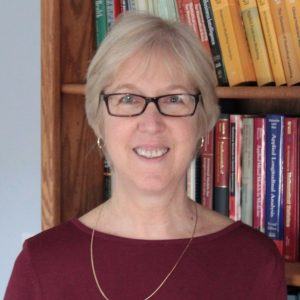 Nancy R. Cook, ScD ’82
Nancy R. Cook, ScD ’82
Prof of Epidemiology, Harvard Chan School
Prof of Medicine, Harvard Medical School
Where do you currently work and what are your job responsibilities?
I have worked in the same division at the Brigham and Women’s Hospital since I graduated from HSPH in 1982, with some time off for child-rearing. I have been the statistician for several large randomized trials, and am currently the chief statistician for the Women’s Health Study and the VITamin D and OmegA-3 TriaL (VITAL).
For those I help prepare data monitoring reports as well as collaborate on several analyses and papers. I work on many other projects as well, including longitudinal studies of blood pressure, with all the issues of measurement error, missing data, and screening rules. On the basis of one of these projects, the Trials of Hypertension Prevention (TOHP), I became involved in analyses of sodium and its long-term effects on cardiovascular disease. I also work on both applied and methodologic projects related to risk prediction, and I have taught a course on data mining and predictive modeling at Harvard Chan for several years.
What do you like most about your current position?
I have been very fortunate that the group has maintained continuous funding through the years, and it has offered me the opportunity to both contribute to clinical and epidemiologic investigations as well as follow up on my own methodologic interests. I work with a very talented bunch of investigators, both MDs and PhDs, who generate some really interesting projects. Also, the group as a whole, both staff and investigators, is great to work with, and for the most part we really enjoy our work.
Why did you choose to study biostatistics and what led you to Harvard?
I had an interest in working in medical research, but I wasn’t sure that medical school was right for me. I started out as a chemistry major, but soon realized that I didn’t like working in a lab! I also enjoyed math, but I didn’t want to be a pure mathematician or an accountant. I found out about biostatistics in my college guidance office, and it seemed perfect. It combined my interest in medicine with my skills in math. As for Harvard, it obviously had a great reputation and I knew I would get a great education there.
What was the most rewarding part of your degree program?
For the two years of my master’s program I was a double-major in biostatistics and epidemiology. I really enjoyed the overlap between the two disciplines. I liked the applied nature of the epi courses, but using the more mathematical skills of biostatistics.
Interacting with other students is always one of the best parts of any degree program. Besides learning together and from each other, we had a lot of fun socializing. I remember Sunday afternoon softball games and even some dance classes together.
What was the most challenging part of your degree program?
I suppose since my interest was in medical applications, the more theoretical courses were more difficult, though I don’t remember anything specifically. I think the hardest thing was coming up with a thesis topic that was both interesting and novel. Not every proposal works out to have a nice solution!
How did your experience at Harvard prepare you for your career?
All the courses and the faculty at HSPH obviously provide great training in biostatistics. Besides that, the school offered me many connections and opportunities for starting off on my career.
What advice would you give to current or prospective students?
My advice would be to really take advantage of your time at Harvard Chan. The biostatistics courses offered are top-notch. If you are interested in applications, though, it can also be helpful to take courses in other areas. I found that my courses in epidemiology really helped with some issues that are not typically emphasized as much in statistics, such as design of observational studies, various types of biases, or practical issues related to questionnaire design or measurement error. If you are interested in working in a particular applied area, it can be useful to take some of those courses also.
Most importantly, enjoy the people. You can make some life-long friends with similar interests. You can learn a lot from each other, and friends can also contribute to your research network. I still find it fun to catch up with old friends at research meetings every now and then.



